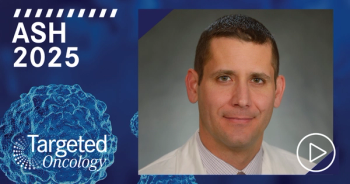
How BCMA CAR T-Cell Therapy Provides Later-Line Options in R/R Multiple Myeloma
During a Case-Based Roundtable® event, Abdullah Khan, MBBS, discussed the different outcomes with idecabtagene vicleucel in patients with relapsed/refractory multiple myeloma in both the clinic and real-world settings in the second article of a 2-part series.
Targeted Oncology: What has been the response to idecabtagene vicleucel (ide-cel; Abecma) for patients with multiple myeloma on a bridging therapy prior to this treatment?
ABDULLAH KHAN, MBBS: There have been subset analyses [
What adverse events (AEs) associated with ide-cel should be noted?
The most important AE to highlight was that 88% [of patients experienced] cytokine release syndrome [CRS] at any grade, but 4% [had grade 3 or 4 CRS, and there were 2 deaths]...on the study overall.2 Any-grade neurotoxic events were seen in 15%, while high-grade neurotoxic events were seen in 3%.2 It's not the perfect therapy, but these are now becoming more manageable toxicities as we're becoming more aggressive with prophylaxis [treatment]…alongside debulking the patient’s disease as much as we can prior to the therapy.
We're finding ways to make this treatment better [and more tolerable]. I think we also have a better understanding of how to support them from an infection perspective. Sometimes, we run into issues with cytopenia, and their white blood cell count might measure low, but in my experience, they come back up after a period of time. For example, there are some patients we’ve had to rescue with their stored stem cells to bring up their platelet counts, but these are all the things we're learning to improve outcomes with CAR T-cell therapy.
How has ide-cel performed in the real-world setting?
[Looking at] quality-of-life data, many recorded negative symptoms decreased while all positive measurements got even better.3 They've even done real world analyses of outcomes with ide-cel. This is…[focused on] the later line data after the fourth-line therapy, and the CRS rates in the clinic are similar between the trials, [along with] neurotoxic events.4 The trial patients did do better compared with what we see in the clinic, and that might [have to do with] opening the floodgates [in the real-world setting].
Patients [in the real-world setting are] on, for example, their tenth line of therapy and they're not going to do as well as [the patient on] their fourth line of therapy. If they've had a prior B-cell maturation antigen therapy, like belantamab mafodotin [Blenrep], in the clinic and then you send for CAR T-cell therapy, will they respond to it? Yes, they will; it's not as great as a response at [approximately] 71%, but those are still pretty good odds of responding to the BCMA CAR T-cell therapy.4 Depending on the type of prior BCMA therapy there's also differences [in outcomes], but I think if you have a patient who's gotten something like teclistamab-cqyv [Tecvayli] and then you're thinking [about what you would] still use down the line, CAR T-cell therapy is not an unreasonable option.








































